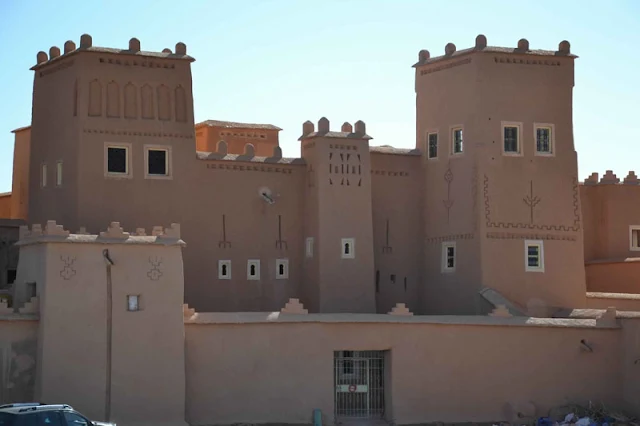Kasbah Taourirt In Morocco
 |
Kasbah Taourirt In Morocco |
Kasbah Taourirt is a historic building in Ouarzazate, built in the 17th century. The Kasbah is one of the national attractions in Morocco, and its function is currently a tourist and cultural function in particular. It also holds concerts, shows and seminars. Through its strategic location overlooking the valley, its function was military and commercial,
Date
 |
| the Kaaba of Taourirt |
According to the popular novel, the Kaaba of Taourirt was founded in 1171 AH / 1754 by Amgar Hammad, one of the most important wealthy people of the region at that time. After his death, he left his wife, who lived there until she joined him. It was a palace (meaning "roundabout"), which was located in the Wazazat valley, which was a tributary of Wadi Draa. The location of the palace was changed, fearing sudden floods. When the parents of Sidi Yahya: Al-Najem and Adammad came and brought guests to the palace residents, their knowledge of the valley was great for their arrival from Zarqa and exactly from the Doirat. They advised the "Tiglit" people to leave the valley bank to the top of the hill (Taourirt Amazigh), which oversees the palace. Ait Boukhroush, Ait Bahdo, Sinhaji, Ait Başalh and Ait Lashkar (a Jewish family) took the shout seriously. Where the faith and belief of the people of the region dignified parents and paranormal is very large
Al - Kalawi period
 |
| the Kaaba of Taourirt |
During his wars between 1292 AH / 1874 AD and 1297 AH / 1880 AD [1] he was captured by the tribes of Ait Zeinab, Tivolt, and Ait Ben Haddou. When he reached the depth of Ouarzazate, he captured Taourirt Kasbah in 1294 AH / 1877 AD after he fled. Including Sheikh Mohammed bin Abdullah. After controlling the Taourirt Kasbah, Mohammed Abibet al-Mazwari was able to control the relentless commercial movement between the oases of Draa and the markets of Ouarzazate and between the latter and the country of Dades, Skoura and Tudge. [2] During the reign of his sons Al-Thami Al-Kalawi and Al-Kalawi Al-Kalawi, the Taurirt Kasbah was a junction for the convoys coming from the north to the south. The Al-Tahami Al-Kalawi ordered Mohammed Bin Al-Jailali to rebuild some of its damaged parts in 1344 AH.
After the appointment of the civil Caliph Khalifa of Sultan Hassan I on the southern regions, until the Sultan died in the year 1311 AH / 1894 CE, the tribes were defeated and revolted against their leaders, and the "Saybah" most of the areas attributed to the Alklawi, and the tribes of Ait and Wazquit Hammadi Mazwari fortress Torset for seven months. Al-Kalawi went to the south to lift the siege on his brother.
When Hammadi Al-Kalawi extended the order, he brought the masons from Ity Bouyhiya, Amgran and Dades, the dust from the area called Wad Al Dahab today, and the wood from Oasis Vint; , "Oasis of Iglesia", "Oasis of Technzalt" and "Oasis of Tamayost" and of the agricultural lands that were confiscated from the people. [3]
Collective and mandatory work was the "cost", where the members of the Dwawir of his circle of influence are used alternately, except the jurists, the Quranic keepers, the widows and the karamans. The family was known for their brutality and brutality with unending orders. This was manifested in the Ait Accident Tower, where some individuals built it as a punishment for intimidation and torture after refusing some of Hamadi's orders. The case was expanded from a mere shelter for Kalawi and his entourage to a headquarters of the regional authority, where she was given the importance of using decoration materials and decoration of wood engraved on the roof of some rooms: the dining room and the dome of the
Architecture
The gate has two main gates: Bab Shamali, which is the "Ami Nannarran" (Bab Al Bayader), which is today the main entrance to the stands. It leads to the "Rehab Neklad" (King's Square), where there are feasts. German dating back to 1884, and is a gift from Hassan I of the Chaldean, and there is inside "Rehab Nknsu" (inner courtyard) for the harem and servants. And a south-east door, is the "Imi Nnadav" any door guards, after the restoration is topped by a tower is relatively high, which is public (entrance from the roundabout Sidi Daoud).
Although a large part of it has been restored, it is the place of the Althami al-Kalawi and his wives and the bathroom and the guest room and the lounge that was overlooking the large square and watching the next and departure, the western part, which was the kitchen and other facilities is still not used because it is not restored. Some of the ceilings of the Casbah still retain the characteristics of Moroccan architecture and the Andalusian Arabic inscription, whose ceilings were made of cedar wood from the Mediterranean Atlas, palm trees, palm trees, and cane. The basic colors used to decorate the ceilings are still present. Yellow yellow and red Of henna and green of mint present
 |
| the Kaaba of Taourirt |


0 Comments